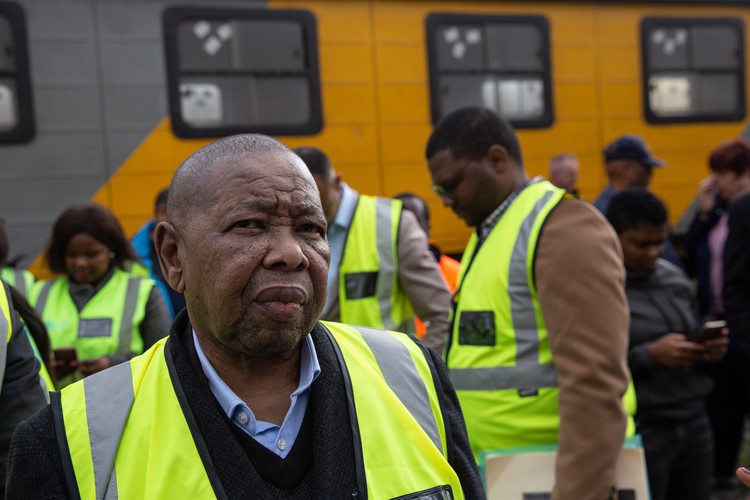
Commuter activist group #UniteBehind is taking Minister of Transport Blade Nzimande to court. Archive photo: Ashraf Hendricks
28 March 2019
Commuter activist group #UniteBehind has asked the Western Cape High Court to order the Passenger Rail Association of South Africa (PRASA) to hand over a list of all the security companies it employed in the Western Cape, as well as the contracts with these companies.
Both PRASA and the Minister of Transport have refused requests for the documents to be made available. The coalition first asked PRASA for the information in January 2018 following the killing of a train driver and a security guard on the Central Line servicing Mitchells Plain and Khayelitsha. The line was shut down for days earlier this year because of violence on the trains affecting tens of thousands of commuters.
The respondents in the case are PRASA’s information officer, PRASA itself, and Minister of Transport Blade Nzimande.
#UniteBehind argues that the information it has requested will show that PRASA is using external security services without having valid contracts in place. The organisation suspects that the security personnel providing these services are not registered as security service providers, as is legally required, and do not have the training and licenses to perform the desperately needed security on these trains.
Members of #UniteBehind who use the trains in the Western Cape have regularly reported that the security personnel employed by PRASA in the Western Cape are often nowhere to be seen.
In an affidavit to the court, James Stent, a #UniteBehind member, explains that commuters report that “there is no visible security at most stations. Security personnel do not patrol, are not present on platforms and often stay hidden away in control rooms or cluster in one place, often seated. … Security guards that are visible are insufficiently trained and would not be able to put a stop to violent situations”.
A leaked PRASA internal memo published by GroundUp in 2017 indicated that PRASA was aware of the poor state of security on the trains even then. The memo stated that the non-performance by PRASA’s security contractors led to over R100 million in damages having been incurred in one year in the area of the Central Line known as the Bonteheuwel Split. Officials from PRASA have publicly admitted that PRASA’s security contracts have been irregular since at least 2004.
#UniteBehind has good reason to believe that corruption within PRASA is behind the decline in security on Metrorail. The Public Protector’s investigation into PRASA of 2015 uncovered serious maladministration, corruption and intimidation at the agency under the leadership of former CEO Lucky Montana. (Montana has denied the allegations.)
The forensic investigations subsequently commissioned by the National Treasury and concluded in July 2017 were never made public. However, extracts from the reports leaked by whistleblowers at PRASA showed that the investigation had concluded “that there are endemic procurement irregularities in the appointment of contractors, perennial non-compliance with contractual obligations […] and a failure to protect PRASA’s infrastructure and its employees, and to secure the general safety of commuters”, according to Stent’s affidavit.
Many of these reports have been published by GroundUp since 2017 in what is known as PRASALeaks.
PRASA initially refused #UniteBehind’s request for the documents without giving reasons. But after Nzimande was appointed Minister of Transport and a new interim board was appointed in April last year, #UniteBehind renewed its efforts to get the information and submitted a formal application to PRASA in terms of the Promotion of Access to Information Act. When no documents were forthcoming, #UniteBehind lodged an internal appeal with the Minister of Transport. Nzimande never responded to the appeal.
The Minister has indicated that he will oppose #UniteBehind’s application.